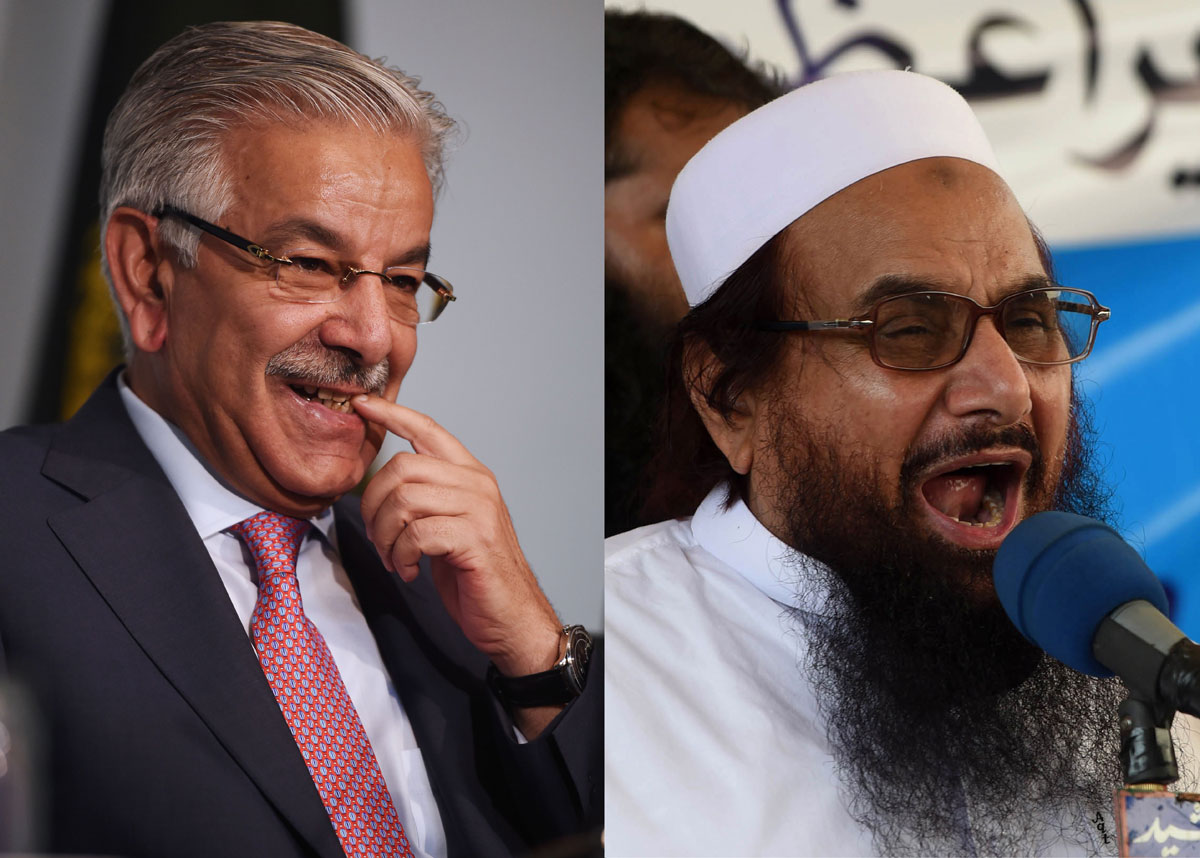Hafiz Saeed, LeT are ‘Liabilities’: Pak Says in U.S.
(Left): Pakistani Foreign Minister Khawaja Muhammad Asif gestures while briefing the media in Islamabad, Sept. 7. (Farooq Naeem/AFP/Getty Images). (Right): Pakistani head of the banned organization Jamaat-ud-Dawa (JuD) Hafiz Saeed addresses supporters during a protest against India in Lahore, June 12, 2015. (Arif Ali/AFP/Getty Images)
Pakistan’s Foreign Minister Khawaja Asif has acknowledged, Sept. 26, that Mumbai terror attack mastermind Hafiz Saeed, the Haqqanis and the LeT are “liabilities” but the country lacks the required “assets” to get rid of them, writes Sajjad Hussain.
Khawaja Asif said that the U.S., which is putting pressure on Pakistan to tackle terrorist groups operating from its soil, once used to treat them as “darlings” just 20 to 30 years back.
President Donald Trump had last month criticized Pakistan for its support to terror groups, saying it receives billions in U.S. aid but continues to harbor militants.
“Don’t blame us for the Haqqanis (the Haqqani terror network) and don’t blame us for the Hafiz Saeeds (chief of Jamaat-ud-Dawa terror group),” Khawaja Asif said at the Asia Society forum in New York, Sept. 26.
“These were the people who were your darlings just 20 to 30 years back. They were being dined and wined in the White House and now you say ‘go to hell Pakistanis because you are nurturing these people,’” he was quoted as saying by the state-run Associated Press of Pakistan.
It is very easy to say Pakistan is floating the Haqqanis and Hafiz Saeed and Lashkar-e-Taiba. They are liabilities, Asif said.
“I accept that they are liabilities, but give us time to get rid of them because we don’t have the assets to match these liabilities and you are increasing them (our liabilities) further,” the minister said.
Pakistan is ready to work with the U.S. for effective management of the Afghan border to stop terrorist infiltration and to facilitate a peace settlement in Afghanistan, he said.
Speaking at the forum, Asif said that there was no military solution to the festering conflict in Afghanistan.
“Scapegoating Pakistan for all the Afghan ills is neither fair nor accurate. This will only help forces that we are trying to fight collectively,” he said.
Asif also talked about Pakistan’s relations with India, the Kashmir dispute, counter-terrorism measures and the country’s economic progress.
Pakistan has a “larger stake” in seeing the return of peace and stability in Afghanistan than any other country, having suffered grievously from the conflict and instability across the border.
“We are mindful of the strong desire in the U.S. to bring the ‘long war’ in Afghanistan to an end. We support this objective wholeheartedly and are ready to help in any way we can to achieve peace and stability in Afghanistan,” he offered.
He, however, made it clear that there were obviously clear limits to what Pakistan could do.
“We cannot take responsibility for Afghanistan’s peace and security and be asked to achieve what the combined strength of some of the most powerful and richest countries could not accomplish,” he said.
Talking about Pakistan’s sour relations with India, the minister said that a new initiative was needed to bring India and Pakistan to the negotiating table.
He said that the need to discuss all issues, including the decades-old Kashmir dispute the main source of tension between the two countries.
“Peace in the neighborhood is impossible to achieve unless relations with India improve. Pakistan reached out to India to seek normalization of relations and resolution of all disputes through dialogue and engagement, but India did not reciprocate,” Asif claimed.
Pakistan is ready to work with India to seek peaceful resolution of all disputes and to create an environment of peace and stability allowing the people of the two countries to realize their aspirations of prosperity and development, the minister added.


